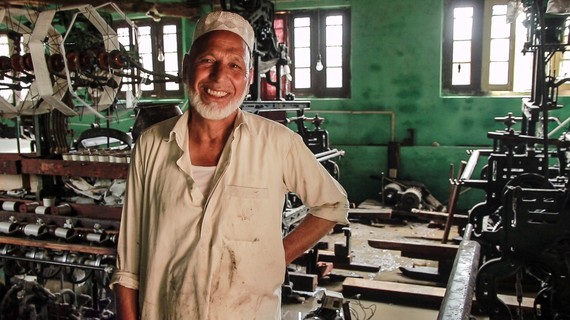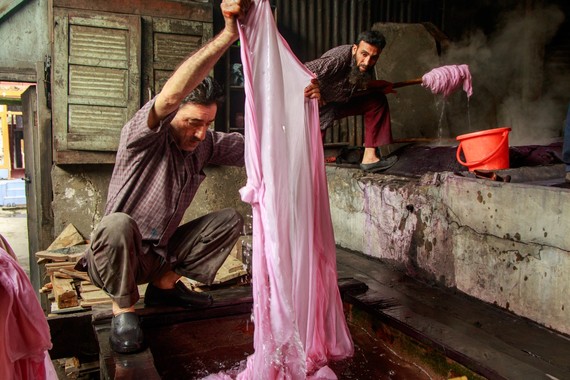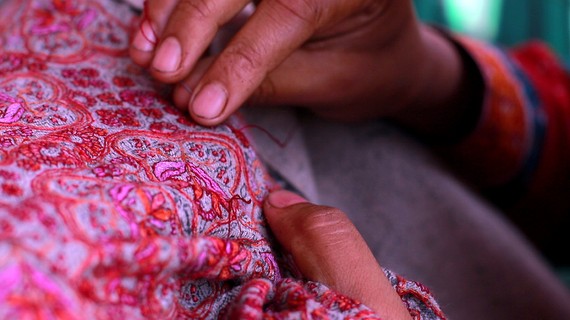The 2014 floods in Kashmir caused widespread destruction and displacement. Among those still reeling from the after-effects are the artisan weavers of the state. Among them is 65-year-old Bashir Ahmad Bhat. He stands in his weaving centre, surveying the room. The floods have completely destroyed the centre, washing away precious material and destroying machinery. Silk yarns, which are worth at least Rs 4000 per kilo, have been ruined. He tells us, "You can still see the water in the factory." Remnants of the devastation keep the nightmares of the floods fresh for Bashir and several other artisans like him across Kashmir.
Bashir excels at Khatan cashmere work, and he is dependent on his semiautomatic loom for his livelihood. His family consists of him and his three children -- two daughters and a son. While one daughter teaches in a school, his other daughter and his son help him in his business with weaving and embroidering. Bashir is just one of the several craftsmen in Kashmir who are employed in this field.
![2015-08-14-1439557229-6441703-BashirAhmad.jpg]()
Bashir Ahmad stands in his loom centre
About 30% of Kashmir's economy is dependent on art and craft. Their speciality lies in weaving shawls and carpets, with each piece showcasing a unique form of handwork. Several pieces are completely hand-made; some carpets or shawl could take up to six months to be completed, given the intricacy of the work.
But for all the hours and labour they put in, the rewards are meagre. Most of them are paid just Rs 150 per day for their work, despite starting work at dawn and ending past sundown. It's worth noting that 65 years ago, artisans Rs 100 per day, and the rate has stayed at the same level ever since.
Other things have remained the same too. The cloth and threads are manually dyed; set up in 1854, the Kashmir Dyeing Centre has not changed much. Says Rashid Ahmad, the owner of the centre, "Everything is manual. We dye wool just the way our ancestors did." The process involves plenty of manual labour and often takes a toll on the artisans.
![2015-08-14-1439557349-3357934-DyeingCentre.jpg]()
Employees at the dyeing centre
However, very few employment opportunities exist in Kashmir outside of the handicrafts industry. Even an individual who has the advantage of an education is likely to end up making handicrafts. Ask any artisan today if they would want their children to take up this livelihood, and the answer is a resounding "no". They want a better life for them, one where they may be paid more.
In order to help artisans and to help break the vicious cycle of earning only the bare minimum, JK Handloom Fabrics stepped in. Its aim is to focus on design development and marketing the finished products to the right customers through the right channels. By buying directly from the artisans, it creates livelihood opportunities for them. It ensures that it follows only fair trade practices.
The Ants Craft Trust helps artisans from Kashmir by retailing their finished products at its store in Bangalore. They place orders for the products through JK Handloom Fabrics. The Trust visited the artisans in Kashmir, in order to ensure fair trade practices were in place and were being followed.
The floods of 2014 left Kashmir reeling. Causing widespread devastation, the floods washed away many raw materials and damaged machinery which the artisans used to earn their livelihood. Bashir is one such example. His centre can no longer keep rainwater out, as the floods have caused irreparable damage; even the slightest bit of rain floods the building. He has lost goods that took months, perhaps years, to create. The Ants Craft Trust stepped in to help the affected by placing a substantial amount of orders for shawls through JK Handloom Fabrics, which helped the artisans get back on their feet and resume their lives.
![2015-08-14-1439557514-8129247-4.jpg]()
An artisan works on a shawl
However, despite the help given so far, Bashir and other artisans in Kashmir desperately need help with funds in order to keep up with the demand for their products, and to repair the damages caused by the floods. Much of the demand comes from international markets, such as the USA. They need financial support to help them keep going with their business ventures, and to help procure new machinery that would replace the obsolete models being currently used. With the impact of the floods still being felt in Kashmir, your contributions will help the artisans get back on their feet, and overcome the disaster.
With your help, our artisans in Kashmir can continue weaving their magic, and make us proud to wear the Make in India label.
Click here to support their endeavours.
A version of this story was published on TheAlternative.in
![]() Like Us On Facebook |
Like Us On Facebook |
![]() Follow Us On Twitter |
Follow Us On Twitter |
![]() Contact HuffPost India
Contact HuffPost India
Bashir excels at Khatan cashmere work, and he is dependent on his semiautomatic loom for his livelihood. His family consists of him and his three children -- two daughters and a son. While one daughter teaches in a school, his other daughter and his son help him in his business with weaving and embroidering. Bashir is just one of the several craftsmen in Kashmir who are employed in this field.

Bashir Ahmad stands in his loom centre
About 30% of Kashmir's economy is dependent on art and craft. Their speciality lies in weaving shawls and carpets, with each piece showcasing a unique form of handwork. Several pieces are completely hand-made; some carpets or shawl could take up to six months to be completed, given the intricacy of the work.
But for all the hours and labour they put in, the rewards are meagre. Most of them are paid just Rs 150 per day for their work, despite starting work at dawn and ending past sundown. It's worth noting that 65 years ago, artisans Rs 100 per day, and the rate has stayed at the same level ever since.
Other things have remained the same too. The cloth and threads are manually dyed; set up in 1854, the Kashmir Dyeing Centre has not changed much. Says Rashid Ahmad, the owner of the centre, "Everything is manual. We dye wool just the way our ancestors did." The process involves plenty of manual labour and often takes a toll on the artisans.

Employees at the dyeing centre
However, very few employment opportunities exist in Kashmir outside of the handicrafts industry. Even an individual who has the advantage of an education is likely to end up making handicrafts. Ask any artisan today if they would want their children to take up this livelihood, and the answer is a resounding "no". They want a better life for them, one where they may be paid more.
In order to help artisans and to help break the vicious cycle of earning only the bare minimum, JK Handloom Fabrics stepped in. Its aim is to focus on design development and marketing the finished products to the right customers through the right channels. By buying directly from the artisans, it creates livelihood opportunities for them. It ensures that it follows only fair trade practices.
The Ants Craft Trust helps artisans from Kashmir by retailing their finished products at its store in Bangalore. They place orders for the products through JK Handloom Fabrics. The Trust visited the artisans in Kashmir, in order to ensure fair trade practices were in place and were being followed.
The floods of 2014 left Kashmir reeling. Causing widespread devastation, the floods washed away many raw materials and damaged machinery which the artisans used to earn their livelihood. Bashir is one such example. His centre can no longer keep rainwater out, as the floods have caused irreparable damage; even the slightest bit of rain floods the building. He has lost goods that took months, perhaps years, to create. The Ants Craft Trust stepped in to help the affected by placing a substantial amount of orders for shawls through JK Handloom Fabrics, which helped the artisans get back on their feet and resume their lives.

An artisan works on a shawl
However, despite the help given so far, Bashir and other artisans in Kashmir desperately need help with funds in order to keep up with the demand for their products, and to repair the damages caused by the floods. Much of the demand comes from international markets, such as the USA. They need financial support to help them keep going with their business ventures, and to help procure new machinery that would replace the obsolete models being currently used. With the impact of the floods still being felt in Kashmir, your contributions will help the artisans get back on their feet, and overcome the disaster.
With your help, our artisans in Kashmir can continue weaving their magic, and make us proud to wear the Make in India label.
Click here to support their endeavours.
A version of this story was published on TheAlternative.in
 Like Us On Facebook |
Like Us On Facebook |  Follow Us On Twitter |
Follow Us On Twitter |